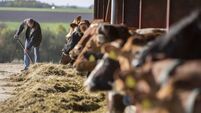Rush to replace antibiotics
Even the use of plant extracts, once dismissed as quack science, is attracting growing interest in the hunt for alternatives.
At the University of Leeds in England, biologists are experimenting with essential oils from thyme as a treatment for coccidiosis in chickens, one of the diseases currently controlled with in-feed antibiotics.
"Antibiotics are excellent growth promoters, and the ban will put EU farmers at a competitive disadvantage with producers elsewhere, so we are trying to find sustainable alternatives," said researcher Dr Henry Greathead.
Another Leeds University project is investigating the use of extracts from garlic and aniseed to increase digestive efficiency in cows.
Even if antibiotics were not being ruled out by the EU, they are becoming less effective at fighting infections a timely warning for farmers as bird flu becomes the latest agricultural bug to hit the headlines.
Basically, the more an antibiotic is used on farms, the more likely it is that bacteria will become resistant to it.
Meanwhile, there is increasing public concern that antibiotics damage human health by causing resistance.
This is just not a consumer scare: doctors know that increasing levels of antibiotic resistance have many potentially disastrous implications. For example, poisoning caused by food contaminated with antibiotic-resistant strains, is difficult to treat.
Some bacteria are now resistant to several antibiotics; these are called 'multi-drug resistant'.
Researchers say it is difficult to stop antibiotic resistance occurring, but they are looking for alternative anti-microbial therapies instead.
Here in Ireland, researchers from St Vincent's University Hospital Education and Research Centre, University College Dublin and Trinity College Dublin have teamed up to investigate anti-microbial peptides in chickens that might naturally protect against infection and might be potentially used instead of antibiotics.
Professor Cliona O'Farrelly at St Vincent's says the peptides can have potential uses in healthcare and foods.
They can be used directly to improve chickens' or pigs' immune systems.
They could be added to foods for people with special needs, such as immuno-suppressed, or older people who have an increased risk of infection, thus replacing antibiotics.
Food containing anti-microbial peptides may possess a function above and beyond its nutritional role and can then be termed "functional foods."
So far, the Irish research group have identified nine anti-microbial peptides in the chicken genome.


